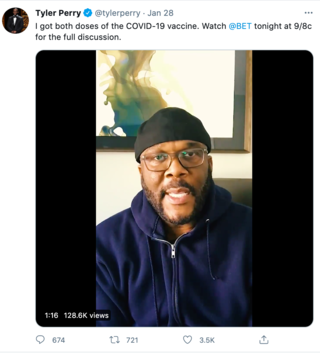Health
Can Celebrities Help Increase Vaccine Turn-Out?
That depends... on who they are, how they do it, and who YOU are.
Posted April 16, 2021 Reviewed by Devon Frye
Key points
- Social norms are powerful determinants of behavior.
- Celebrities you feel connected to may impact your health-related thoughts and behaviors—including your decision to get vaccinated or not.
- Humor, two-sided appeals, and an audience-tailored approach may be keys to a successful vaccine campaign.
This Sunday night, NBC will be hosting a special “Roll Up Your Sleeves” program hosted by Seahawks quarterback Russell Wilson and his wife and singer, Ciara, to encourage Americans to get vaccinated for COVID-19. The program will feature President Biden, along with Barack and Michelle Obama, and a smattering of other high-profile celebrities such as Charles Barkley, Faith Hill, Jennifer Lopez, Matthew McConaughey, and, not least, Dr. Anthony Fauci. This campaign has already been met with both enthusiastic support and hostile skepticism in the Twitter-verse, and invites the question: just how effective are celebrities at persuading us to engage in health-relevant behaviors?
To back up a bit, one commonly applied psychological theory in the domain of public health has been the Theory of Planned Behavior (Ajzen, 1991, a former UMass mentor of mine!) which specifies three primary ingredients that, in combination, increase intention to enact a particular health behavior, which in turn increases the likelihood of the behavior itself:
- a positive attitude toward the behavior (i.e., finding it desirable)
- a perception of behavioral control over engaging in the behavior (i.e., the perceived ability to do it)
- social norms in favor of such a behavior (important others and/or ingroup members also think this is a good idea).
Arguably, celebrity campaigns to encourage COVID vaccines speak to all three of these dimensions, but perhaps most significantly the last one. (Research shows that these ingredients also are relevant to the COVID-relevant behaviors social distancing and hand-washing practices [Trifiletti et al., 2020].)
Celebrities apparently had an early edge over other public figures and organizations such as politicians or medical institutions when it came to posting about COVID-19. Kaminski et al. (2020) analyzed the number of and response to (via likes, retweets) tweets about COVID generated by top-ranking celebrities on Twitter, politicians, health organizations, medical and academic institutions between January and April 2020. Results showed that although institutions and health agencies posted the most tweets, the celebrities who posted garnered the most “engagement” for their tweets (number of likes/retweets adjusted for number of followers).
Moreover, analysis of the valence of the tweet found that celebrities and politicians used more positive words than health/medical organizations did. Thus, celebrities may indeed have a disproportionate impact on public attitudes/information about COVID-19.
Posts with more likes also signal “social proof.” Consensus effects are powerful—when we believe that a vast number of people endorse a particular idea or statement, we may be moved to follow suit. (Ryan Reynolds, who has 17.5 million followers, garnered over 1 million likes and 85K retweets for his vaccine shot.)
What about the impact of specific celebrities? Another study capitalized on Tom Hanks’ early public announcement about his and his wife’s COVID diagnosis on social media (Myrick and Willoughby, 2021). Perceived change in response to the announcement among those who had heard about it was predicted by “involvement” with Hanks (i.e., feeling like Hanks could be a friend, aka having a “parasocial relationship” with him, and feeling identified with Hanks in some way).
The tendency to rely on celebrities, family, friends, and/or former President Trump for health information relative to relying on medical organizations like the CDC was another predictor. This self-reported change took the form of feeling sad or hopeful, intending to seek out more information, and being more vigilant about the threat of COVID. As one participant put it “…Tom Hanks is the guy we feel like we know, so hearing about him is closer to finding out that a friend or family member has it” (p. 6, emphasis added). (I myself experienced a strong emotional reaction to the COVID-related death of talented singer/songwriter Adam Schlesinger early on in the pandemic. I had done theater with his sister in high school; he was from my hometown. So, although I didn’t actually know him myself, the tragedy of his death suddenly felt very close to home.)
The above research is in step with a recent meta-analysis (Kresovich & Noar, 2020) which found, across a range of studies, that increased parasocial engagement or identification with a given celebrity who discloses or experiences a major health issue is positively associated with the behavioral intention to engage in a relevant medical intervention (e.g., genetic screening, therapy). Interestingly, the effect was stronger for outcomes that did not involve medical intervention, but rather focused on individual-level behaviors (e.g., avoiding drug use or risky sexual behaviors).
Of course, whether you follow a given celebrity on social media to begin with likely reflects a predisposition to respond positively to their tweets, and/or to share their broader values, which might create a circular “preaching to the choir” effect in either direction (pro or anti-vaxx). However, if you are anxious or otherwise on the fence about getting vaccinated, celebrity posts and specials that encourage vaccination may make a difference…under certain conditions.
WHO the Celebrity is Matters
As noted above, the source of a message may itself function as a cue for whether we should take the message seriously or not. If the source is familiar, liked, attractive (broadly construed) they may be perceived to be more credible at the outset, particularly if we are not motivated or able to attend carefully to their message (in which case we may be relying on a so-called peripheral route to persuasion).
Perceived similarity to a given message source is also relevant—a peer is often a more persuasive source, for example, for a college student than a parent or administrator. So, if we identify with a celebrity in some primary domain (identity, ideology, lifestyle), we may be more likely to attune to their messages.
Given the number of Black and Latinx celebrities featured on Sunday’s program, it seems there is at least a partial intention to reach out to communities of color, who may be justifiably wary of top-down medical intervention based on a history of exploitation and abuse (more on this below). This outreach has the potential to be successful if there is a perception the initiative feels authentically derived from those communities; however, some research suggests that there can be a backlash effect if the target audiences believe they are being stereotyped by the advertisers (El-Hazzouri & Hamilton, 2019)—in this case, ostensibly the current administration.
For the most effective vaccine campaign, a range of celebrities who are in themselves, or en masse, popular with diverse swaths of the American public should be encouraged to post. Although some Americans perceive celebrities in general to be low on self-relevance (i.e., “out of touch”), which can inspire immediate reactance (as in this comment under the NBC special article: “When celebrities tell you to do something instantly do the opposite”), most of us, no matter our value system or political ideology, can conjure at least one public figure we feel positively about.
HOW It's Done Matters
The way we attempt to change someone’s mind also matters. Humans do not like to feel like they lack control or autonomy (this starts early—just ask my 4-going-on-14-year-old son). We do not like to feel like we are being manipulated or like our behavior is overdetermined by someone else.
Vaccine posts that are not immediately in step with our own sentiments can seem too forceful or patronizing and may backfire—for example, Morgan Freeman’s recent foray into this conversation in which he explicitly notes that “I am not a doctor, but I trust science. And, I’m told, for some reason, people trust me… I trust science and I got the vaccine, if you trust me, you’ll get the vaccine” appears to have engendered mixed reactions online, perhaps because it was a bit too “on the nose” with regard to perceived celebrity influence. So what techniques seem to be persuasive?
1. Humor.
Humor in advertising, with some caveats in place, can help create positive associations with a particular message, as well as potentially reduce defensive responding and allow us to process otherwise threatening information in a more impactful way. This approach may be especially relevant to men and/or those who subscribe to a stereotypically masculine ethos of stoicism or invulnerability (e.g., Hendriks & Janssen, 2018). Humorous appeals from professional male athletes (say, Russell Wilson?) may be the most effective at targeting those whose identity is more connected to sports and/or masculinity.
Having come of age delighting in City Slickers and Harry Met Sally, I found Billy Crystal’s frame particularly appealing: "I was glad to get this first step towards hugging my kids and my grandchildren again. And I do have a pre-existing, underlying condition—which is terror. So, that was good that I got that." As a lifelong Steve Martin fan, I also appreciated his self-deprecating and grateful tweet about getting vaccinated (and, as if he were a friend, I was very glad to hear it!)
2. Two-sided arguments.
Another successful persuasion strategy involves metaphoric inoculation—when we present the opposing argument before presenting our own. This is effective for a few reasons: one is that it helps us start generating counter-arguments (antibodies!) against the initial position, and another is that it can seem less manipulative or biased to present “both sides” of an issue.
Tyler Perry’s comments are a great example of this kind of strategy—he lets his audience know he identifies with their fears and skepticism, before engaging in a dialogue about the benefits of the vaccine and ultimately, deciding to get one himself. He addresses very legitimate concerns on the part of the African American community in his special and in news interviews.
"'If you look at our history in this country, the Tuskegee experiment, Henrietta Lacks, it raises flags for us as African American people. So I understand why there's a healthy skepticism about the vaccine," Perry said in a "CBS This Morning" exclusive interview Tuesday. "But once I got all of the information, found out the research, I was very, very happy.'" He also begins his special by saying, "I want to make this completely clear, I do not want anybody to take this because I'm taking it... what I want to do is give you the information, the facts..." which may serve to disarm those who are put off by celebrities telling them what to do. (Interestingly and perhaps strategically, the comments under his video were turned off.)

Some research shows that this kind of persuasive strategy works best for those who are uncertain in their attitudes or intentions, rather than those who are already certain in one direction or another. As a side note, the successful anti-smoking "Truth" campaign attempts to target those who might start smoking, or who are trying to stop, rather than those who will resolutely never or always smoke.
3. Tailoring the message.
Finally, focusing on the fit between the frame of a given message and the general dispositions of the target audience can increase persuasion. For example, some research finds that anti-drug PSAs that rely on quick edits and loud music may be better suited to capture the attention of high sensation seekers (those who enjoy risk-taking and high arousal activities), who are also more likely than their lower sensation-seeking counterparts to engage in recreational drug use. Other work shows that messages about being the life of the party vs. enjoying the comforts of home appeal to extraverts and introverts respectively (so-called “self-schema matching”).
Still other persuasive techniques capitalize on whether someone has an independent or interdependent sense of self. In other words, do you define yourself more in terms of your achievements and autonomy, or do you define yourself more in terms of your relationships to others? In the latter case, a plea to get tested for breast cancer so you can be there for your family may be more effective than a plea to get tested so that you can accomplish your own future goals, which may be more effective for the former.
At my own small liberal arts college, a reminder of collective values and a “we precedes me” initiative has sprung up around COVID-19 safety protocols. Our president, Betsy Bradley, who as luck would have it also happens to be a public health scholar, has activated “community care standards” that have enabled our campus to operate in relative safety for the last year.
Celebrities might aim to activate a sense of public responsibility and care for others and/or personal safety in their posts (and if being sexy is your priority these days, Kristin Chenoweth’s tee/post may get the job done).
In sum, there is no one size fits all approach to our current situation. But it pays to be mindful of the source and style of the message. Embedded in those parameters is, of course, the audience. According to recent headlines about half of Republicans are not planning to get vaccinated. Sunday’s initiative on NBC might thus be particularly meaningful if it included any prominent conservative celebrities (at the time of writing, this did not appear to be the case).
Many thanks to my research assistant, Formosa Huang, for her help with this post!




